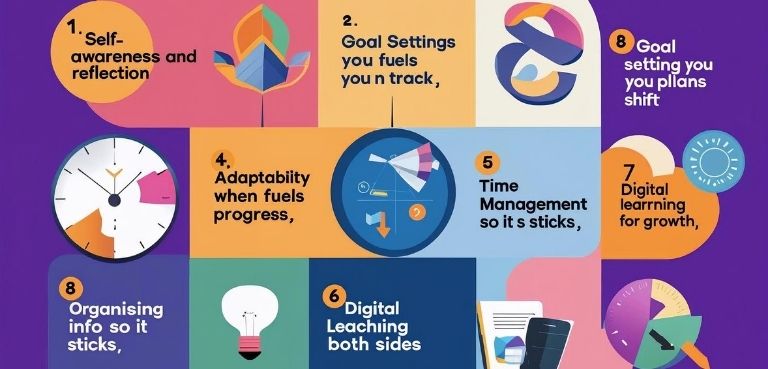You face new tools, fresh rules, and rising goals every month. You ask, “What is learning and development skills?” The short answer: they are the habits that help you grab knowledge fast, test it at work, tweak it, and grow on purpose. When you master them, you turn every task, mistake, and chat into fuel for the next win.
What Is Learning and Development Skills?
Learning and development skills cover how you set goals, track progress, seek feedback, reflect, and adjust. They shape the way you learn, not just what you learn. You link new facts to work problems, build confidence, and keep momentum even when change hits hard. Those skills carry across roles, sectors, and life stages.
Why Strong Learning Skills Matter in UK Workplaces
UK jobs shift quickly. Rules update. Tech moves on. Employers choose people who learn faster than change happens. A barista who masters a new till saves queues during rush hour. A nurse who follows fresh guidelines keeps patients safe. Tight budgets mean managers expect you to drive your own growth. Show that attitude, and you move up sooner.
Real Example: Your First Week in a New Job
Picture day one at a busy care home. You shadow a senior carer and you note routines, but you also spot gaps. You ask, “Why label meds this way?” and then you record answers on your phone. That night, you search for best practice videos. You test a better checklist next shift. Your mentor gives feedback. You refine again. That loop—observe, learn, apply, adjust—shows learning and development in action. It proves value before your official probation review.

Core Skill One: Self‑Awareness and Reflection
Growth starts with clear mirrors. You rate strengths, gaps, and triggers. Maybe numbers scare you, while people skills shine. You note that, plan study time, and track mood swings. Journals help. Short voice notes work too. Reflection turns scattered days into lessons you can use tomorrow.
Core Skill Two: Goal Setting You Can Track
Vague aims stall progress. Set goals that name action, measure result, and set a date. “Finish NHS care record course by 31 August” beats “Work on paperwork.” Stick goals on your fridge, phone lock screen, or desktop. Visual cues keep focus when emails flood in.
Core Skill Three: Feedback That Fuels Progress
Feedback stings less when you ask for it first. Say, “Tell me one thing I can sharpen.” Use video calls, quick chats, or short forms. Listen, thank, and pick one tweak to try. You show maturity, and coaches see their input land. Next time, they will give richer tips.
Core Skill Four: Adaptability When Plans Shift
Trains run late, budgets shrink, and clients change minds. Adaptability turns chaos into practice. Breathe, list new facts, and map next steps. You treat surprises as drills for the next curveball. Colleagues feel calmer around you. That calm builds trust.
Core Skill Five: Organising Info So It Sticks
Dumping links in random folders equals lost time. Use simple systems: one cloud folder per project, tags on notes, or a Kanban board. Review weekly. A clear structure lets you spot patterns, share resources, and recall facts faster during pressure moments.
Core Skill Six: Time Management for Growth
You need time to learn. Block study slots like meetings. Ten minutes of micro‑learning at lunch adds up. Batch similar tasks. Protect focus with “do not disturb” status. You finish work sooner and have free evening hours for new skills.
Core Skill Seven: Digital Learning Tricks
The UK enjoys robust online libraries, open courses, and podcasts. You skim transcripts at 1.5x speed, highlight key lines, and export notes. Chrome add‑ons clip pages into flashcards. You swap mindless scrolling for micro quizzes. Tech moves content to memory faster than old revision cards.
Core Skill Eight: Collaboration That Teaches Both Sides
Learning speeds up when you teach back. Pair up with a peer. Share wins, slip‑ups, and resources. You clarify your own thoughts while talking. Your partner offers fresh angles. The group lifted each member higher than the solo study.
Real‑Life Case Study: Sarah the Care Worker
Sarah joined a London agency last spring. She juggled night shifts and a Level 3 course. She set one big goal: land a senior role within a year and she split it into monthly tasks—finish modules, shadow nurses, and lead handovers. After each shift, she asked one teammate for feedback. She logged lessons in a voice memo. She adjusted her care plans weekly. Six months in, her manager noticed smoother shift reports and lower medication errors. Sarah earned an early promotion. Her learning and development skills closed the gap between novice and leader.
Mistakes That Slow Learning
Some traps repeat. You binge on courses without practice and you hoard notes yet never review. You fear feedback and hide errors. So, you chase three goals at once and spread effort thin. Spot those slips and course‑correct fast.
Quick Tips to Strengthen Skills Today
- Schedule a ten‑minute daily reflection.
- Ask one open question in every team meeting.
- Bookmark a free UK learning platform.
- Try the Pomodoro timer for study blocks.
- Set phone reminders for weekly goal reviews.
Linking Skills to Everyday UK Life
Learning and development do not stop at work. You use it when you plan a budget, cook a new recipe, or train for a half‑marathon. You watch a video, try the steps, fail, tweak, and nail the dish. That loop mirrors your career growth. Family, friends, and neighbours benefit when you bring fresh ideas to the table.
Future Trends You Should Watch
AI tutors will tailor lessons on the fly. Micro‑credentials will join CVs like degree badges. Employers will track skill data, not just tenure. Get ahead by learning how to learn now. You will adapt when tools evolve again.
Turn Every Day Into a Class
Learning and development skills answer the big question: What is learning and development skills? They let you turn events, chats, and mistakes into lessons that compound. Start small. Keep notes. Ask more. Share often. The next opportunity will meet a sharper you.
Want deeper expertise in care work? Enrol in our online Personal Development course at School of Health Care today and turn fresh skills into real impact.



